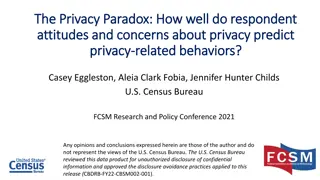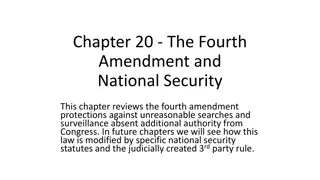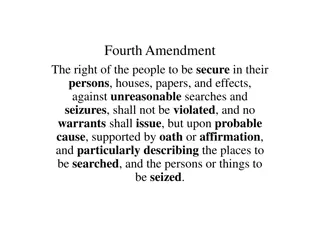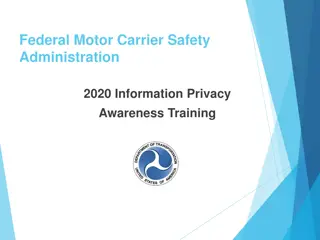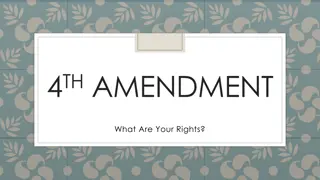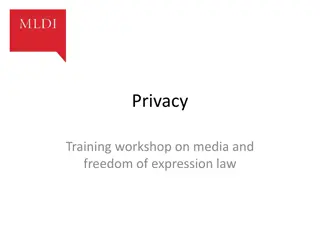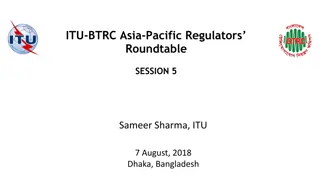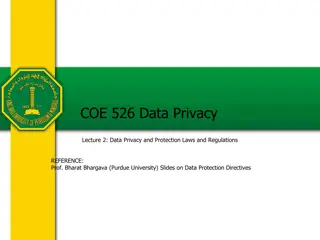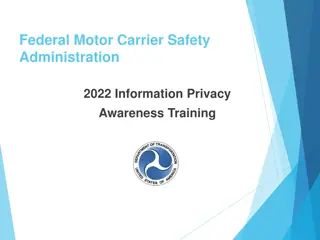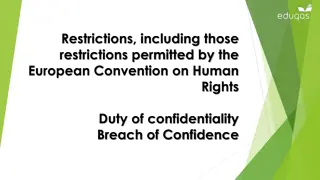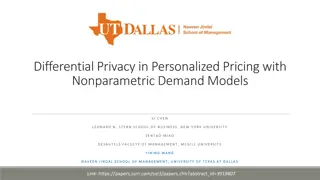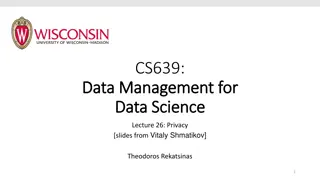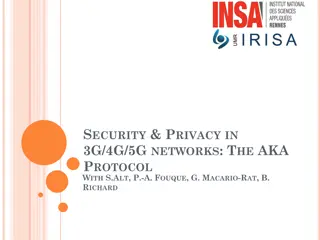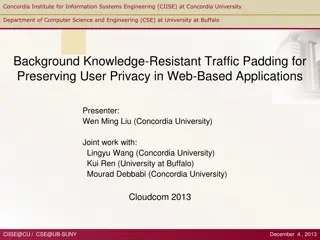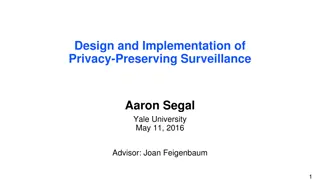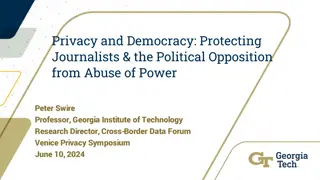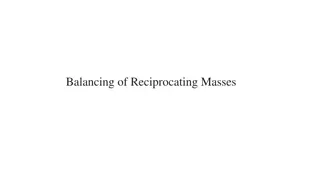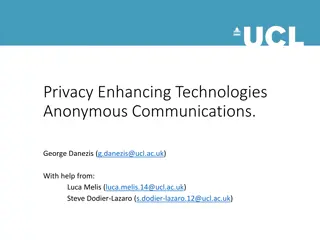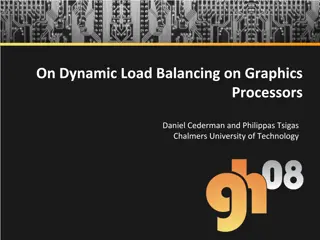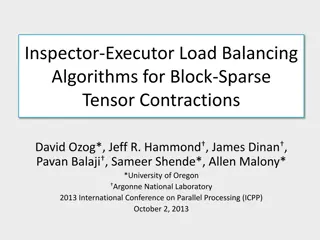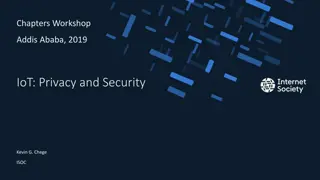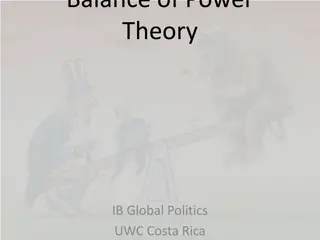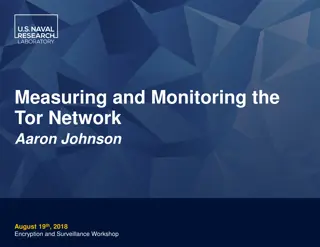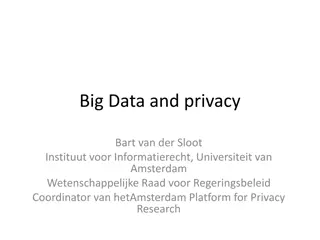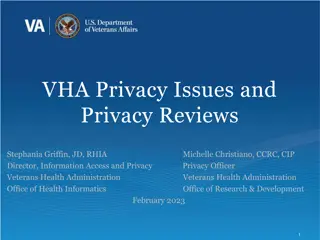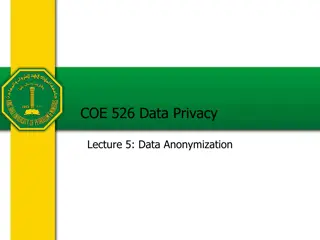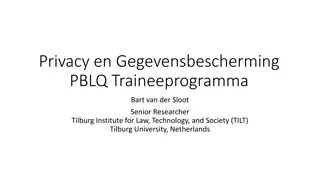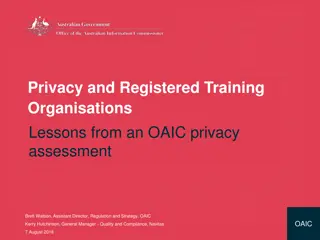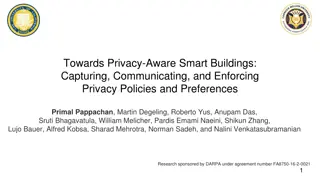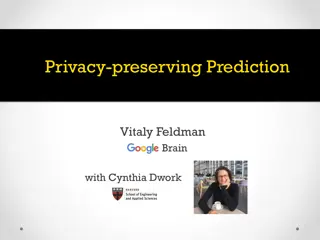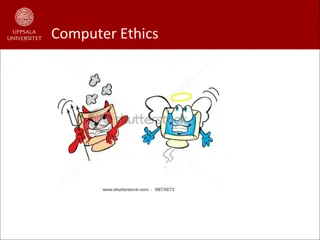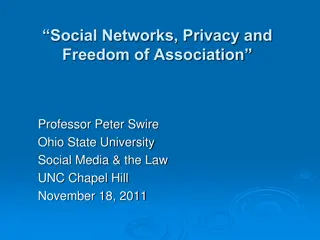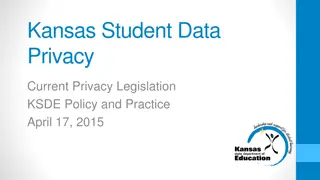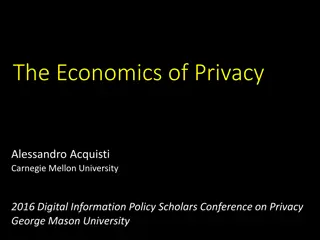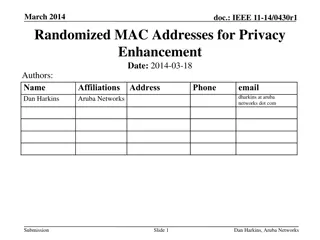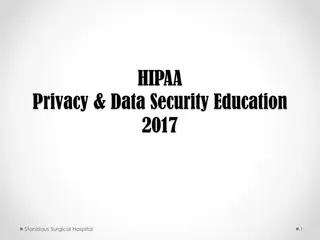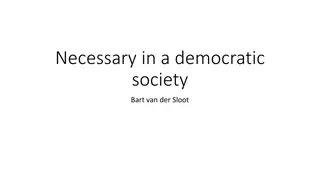Understanding Fourth Amendment Protections: Balancing National Security and Privacy
This chapter delves into the Fourth Amendment protections against unreasonable searches and surveillance, emphasizing the importance of additional authority from Congress for such actions. It explores administrative searches, the cultural perceptions of searches pre and post-9/11, and the key principle of first-party vs. third-party searches. The Fourth Amendment itself is detailed, highlighting the rights of individuals to privacy and security.
Uploaded on Sep 14, 2024 | 0 Views
Download Presentation

Please find below an Image/Link to download the presentation.
The content on the website is provided AS IS for your information and personal use only. It may not be sold, licensed, or shared on other websites without obtaining consent from the author. Download presentation by click this link. If you encounter any issues during the download, it is possible that the publisher has removed the file from their server.
E N D
Presentation Transcript
Chapter 20 The Fourth Amendment and National Security This chapter reviews the fourth amendment protections against unreasonable searches and surveillance absent additional authority from Congress. We are going to take a deeper look at administrative searches before looking at the materials in the book. They are important to understanding national security law. 1
Cultural Knowledge of Searches Most laypersons, and many lawyer's, perceptions of search law are created by the popular media Every police show has a recurring plot line about the evidence obtained with the questionable warrant or without a warrant. Every courtroom drama has its fights over the exclusion of improperly obtained evidence. Prior to 9/11, these criminal law searches were all most people knew about. 2
Post-9/11 Cultural Knowledge of Searches The media is now saturated with antiterrorism themed programming that show shadowy agencies that seem completely unfettered by law. As we will learn later in the course, even antiterrorism agencies are constrained by the law, but not to the same extent as traditional law enforcement. 3
Searches in Law School LSU Law students briefly see administrative searches (regulated industries) in their criminal procedure course. If they take administrative law, they will learn about administrative searches in more detail. In criminal procedure, admirative searches are seen as an exception to the general rule that a search must be based on a 4th Amendment probable cause warrant. In reality, the administrative search world is likely larger than the world of 4th Amendment probable cause warrants. 4
Key Principle: First Party (You) v. Third Party (Them) The 4th and 5th Amendments apply to searches and seizures against your property in your possession or under your legal control, and to searches of your body. Traditionally, when you give your property or information to a third party, you lose your expectation of privacy and thus your constitutional protections, which depend on that expectation. You do retain constitutional protections if these are protected by statute or by common law privileges such as the attorney client privilege. This chapter is about 1stparty searches. We will explore 3rdparty searches in later chapters. 5
Fourth Amendment "The right of the people to be secure in their persons, houses, papers, and effects, against unreasonable searches and seizures, shall not be violated, and no Warrants shall issue, but upon probable cause, supported by Oath or affirmation, and particularly describing the place to be searched, and the persons or things to be seized." 6
4th Amendment Warrant Requirements Probable cause based on reliable information on the location of evidence of a crime that has already been committed. You cannot satisfy this if you are searching for something that is not a crime. A warrant that specifically describes the premises to be searched and what is being sought. Independent magistrate approval of the warrant. 7
History of the Warrant Requirement 14th Amendment Applied to the federal government at the date of the ratification of the constitution. Did not apply to the states until post-14th Amendment incorporation. This is important because almost all criminal law was at the state level. State constitutions Every state had its own version in the state constitution, so states had warrant requirements before incorporation. These were not identical to the 4th Amendment and state SC review did not necessarily track the USSC. 8
1st Party Administrative Searches 9
Frank v. Maryland, 359 U.S. 360 (1959) This is the first SC case to consider the constitutionality of warrantless administrative searches. Frank is a criminal conviction for refusing to allow a warrantless administrative inspection of a private home by a rat inspector. Rats are vectors for bubonic plague, rat bite fever, leptospirosis, hantavirus, trichinosis, infectious jaundice, rat mite dermatitis, salmonellosis, pulmonary fever, and typhus. Rats can attack babies. Rats spoil food and destroy wiring, leading to fires. New Orleans is rat central. 10
The Enabling Act "Whenever the Commissioner of Health shall have cause to suspect that a nuisance exists in any house, cellar or enclosure, he may demand entry therein in the day time, and if the owner or occupier shall refuse or delay to open the same and admit a free examination, he shall forfeit and pay for every such refusal the sum of Twenty Dollars. Note this is a warrantless search, but harboring a rat is not a crime. 11
Is a Man's Home His Castle? In 1765, in England, what is properly called the great case of Entick v. Carrington, 19 Howell's State Trials, col. 1029, [i]t was there decided that English law did not allow officers of the Crown to break into a citizen's home, under cover of a general executive warrant, to search for evidence of the utterance of libel [a crime]. We will see how the court distinguishes this holding based on whether the search is for evidence of a crime. 12
Does the 4th Amendment Bar all Warrantless Searches? "Certainly it is not necessary to accept any particular theory of the interrelationship of the Fourth and Fifth Amendments to realize what history makes plain, that it was on the issue of the right to be secure from searches for evidence to be used in criminal prosecutions or for forfeitures that the great battle for fundamental liberty was fought. [Since the health inspector was not looking for evidence a crime, the court found that the search was reasonable without a warrant.] 13
Does History Matter? "The Fourteenth Amendment, itself a historical product, did not destroy history for the States and substitute mechanical compartments of law all exactly alike. If a thing has been practiced for two hundred years by common consent, it will need a strong case for the Fourteenth Amendment to affect it, . . . ." Jackman v. Rosenbaum Co., 260 U.S. 22, 31. (1922)(Holmes) 14
Camara v. Municipal Court, 387 U.S. 523 (1967) Where did this happen? San Francisco What violations were the housing inspectors looking for? Violation of the occupancy permit What crime was defendant charged with? Not allowing the inspection Factually the same as Frank 15
The Municipal Ordinance "Sec. 503 RIGHT TO ENTER BUILDING. Authorized employees of the City departments or City agencies, so far as may be necessary for the performance of their duties, shall, upon presentation of proper credentials, have the right to enter, at reasonable times, any building, structure, or premises in the City to perform any duty imposed upon them by the Municipal Code." 16
The Writ of Prohibition What are the defendant's allegations of unconstitutional actions? Unconstitutional search under the 4th Amendment, as applied to the states by the 14th Amendment Not granted by the state courts 17
Are the Times Changing? What else is going on at the court and in the country in the late 1960s? Can administrative violations lead to sanctions, such as fines or business closings? What bind does this put a property owner in who wants to challenge the authority of the inspector? Could administrative searches be abused? Was San Francisco just trying to get rid of hippies? 18
Why is the Intent of the Search Critical? Since the inspector does not ask that the property owner open his doors to a search for "evidence of criminal action" which may be used to secure the owner's criminal conviction, historic interests of "self-protection" jointly protected by the Fourth and Fifth Amendments are said not to be involved, but only the less intense "right to be secure from intrusion into personal privacy." (Camara) 19
Would a 4th Amendment Probable Cause Warrant Requirement Mean No Searches? In assessing whether the public interest demands creation of a general exception to the Fourth Amendment's warrant requirement, the question is not whether the public interest justifies the type of search in question, but whether the authority to search should be evidenced by a warrant, which in turn depends in part upon whether the burden of obtaining a warrant is likely to frustrate the governmental purpose behind the search. (Camara) [This is the analysis for a special exception, such as securing a car after an arrest.] This foreshadows Matthews in 1976. 20
Standards for Criminal Probable Cause Warrants "For example, in a criminal investigation, the police may undertake to recover specific stolen or contraband goods. But that public interest would hardly justify a sweeping search of an entire city conducted in the hope that these goods might be found. Consequently, a search for these goods, even with a warrant, is "reasonable" only when there is "probable cause" to believe that they will be uncovered in a particular dwelling." 21
Government Interest in Public Health and Safety Searches The primary governmental interest at stake is to prevent even the unintentional development of conditions which are hazardous to public health and safety. Because fires and epidemics may ravage large urban areas, because unsightly conditions adversely affect the economic values of neighboring structures, numerous courts have upheld the police power of municipalities to impose and enforce such minimum standards even upon existing structures. 22
General Versus Specific Probable Cause There is unanimous agreement among those most familiar with this field that the only effective way to seek universal compliance with the minimum standards required by municipal codes is through routine periodic inspections of all structures. It is here that the probable cause debate is focused, for the agency's decision to conduct an area inspection is unavoidably based on its appraisal of conditions in the area as a whole, not on its knowledge of conditions in each particular building. 23
Factors Supporting General Probable Cause First, such programs have a long history of judicial and public acceptance. Second, the public interest demands that all dangerous conditions be prevented or abated, yet it is doubtful that any other canvassing technique would achieve acceptable results. Finally, because the inspections are neither personal in nature nor aimed at the discovery of evidence of crime, they involve a relatively limited invasion of the urban citizen's privacy. 24
The Consensus from Frank "Time and experience have forcefully taught that the power to inspect dwelling places, either as a matter of systematic area-by-area search or, as here, to treat a specific problem, is of indispensable importance to the maintenance of community health; a power that would be greatly hobbled by the blanket requirement of the safeguards necessary for a search of evidence of criminal acts." [How would you restate this for national security searches?] 25
Standards for an Area (Administrative) Warrant Such standards, which will vary with the municipal program being enforced, may be based upon: the passage of time the nature of the building (e. g., a multi-family apartment house) the condition of the entire area [T]hey will not necessarily depend upon specific knowledge of the condition of the particular dwelling. 26
Searches of Regulated Businesses Business such as gun dealers, pharmacies, restaurants, and other businesses which require a license or permit are subject to warrantless searches (inspections) at reasonable times, as specified in the business regulations. When you engage in a regulated business, the regulations limit your expectation of privacy for administrative searches. Depending on the nature of the business, this limited expectation of privacy extends to evidence of crimes. Pharmacy recordkeeping and drug inventory. Auto wrecking yard and stolen auto parts. Gun dealers with unauthorized inventory. Fraud uncovered by banking regulators. 27
The Punishment/Prevention Dichotomy in Detention/Quarantine/Isolation The Bill of Rights, as incorporated through the 14th Amendment, provides strong theoretical protections for persons whom the state wants to punish. 4th Amendment warrant clause Right to trial by jury Right to counsel Privilege against self-incrimination Right to bail Proof of culpability beyond a reasonable doubt. These apply if I want to lock you up or execute you for punishment. These are only theoretical unless you are rich enough to afford a lawyer, trial prep, and bail, and at know enough to refuse to talk to the police until your lawyer is present. 28
Public Safety Detention v. Criminal Punishment If the purpose of the detention is punishment, you get criminal due process rights. If the detention is to protect others or yourself, and not for punishment, you do not get criminal due process rights. 29
Bail You have the right to be released on bail, if you can afford it. This right is based pretrial detention to assure that you will show up for trial. If the State can show that you are being detained because you are a threat to the public, then you can be denied bail. US v. [Fat Tony] Salerno. 30
Detention to Prevent Harm to the Public If you are detained to prevent the spread of a communicable disease, for mental health reasons, or because you are a dangerous terrorist, you do not get criminal due process rights. The Constitution provides the right to challenge detention through habeas corpus. The Supreme Court requires more review when prisoners who have served their sentence are not released because they are still dangerous. [Kansas v. Hedricks] States provide more due process than the Constitution, including a predetention hearing and period reviews of your detention. 31
Takeaway To the extent that the state can characterize the action as forward looking prevention rather than backward looking punishment, it can avoid criminal law due process requirements, including the 4th Amendment warrant clause. Many of the special exceptions to the 4th Amendment are based on protecting the officers making an arrest or the public. To the extent that national security searches and detentions are forward looking prevention, they escape many of the Constitutional protections. 32
Privacy in Communications and the Reasonable Expectation of Privacy 33
Olmstead v. United States, 277 U.S. 468 (1928) How did you make phone class in those days? Was there an expectation of privacy? Were phone lines all private? How might this have influenced the court? Did this court apply the 4th amendment to wiretaps? 34
Federal Communications Act of 1934 Makes it a crime for any person to intercept and divulge or publish the contents of wire and radio communications. Did the court apply this to federal agents? Yes, and excluded wiretap evidence obtained without a warrant. (Nardone v.United States) How did DOJ interpret this? They could wiretap, just couldn t use it for evidence. How would you know if they wiretapped your client if they do not introduce the evidence? This is the fatal flaw of the exclusionary rule as a privacy protection. 35
Katz v. United States, 389 U.S. 347 (1967) [One of the Warren Court expansions of criminal due process rights.] The court found that defendant had a reasonable expectation of privacy when in a phone booth making a phone call. (The booth was bugged, not the phone.) This established that the 4thAmendment was not tied to trespass on the defendant's property. Judge Harlan s concurrence introduces the notion of a reasonable expectation of privacy as the test for whether a given situation is protected by the 4th Amendment. 36
The Extent of Katz v. United States, 389 U.S. 347 (1967) Remember that the Communications Act of 1934 had already limited wiretapping and prevented its introduction into evidence if done without a warrant. The Katz Court went beyond wiretapping and found that the fourth amendment protected against searches, even if there was no trespass. 37
Katz and Administrative Searches Katz is the same term as Camara and See. All three of these decisions strengthen the individual s expectation of privacy. The administrative search cases now require a general/area warrant. The criminal search requires a proper fourth amendment warrant for electronic eavesdropping even in a public place, if the defendant has a reasonable expectation of privacy. What changes in the connected world is the extent to which you have given up your reasonable expectation of privacy. 38
The Flexibility of Reasonable Suspicion in Justifying a Search or Warrant What about a search prompted by nothing more than an anonymous tip of a planned bombing? [In one case the Supreme Court remarked that] it did not need to speculate about the circumstances under which the danger alleged in an anonymous tip might be so great as to justify a search even without a showing of reliability. We do not say, for example, that a report of a person carrying a bomb need bear the indicia reliability we demand for a report of a person carrying a firearm before the police can constitutionally conduct a frisk. [Does the warrant matter if you just want to stop the bombing?] 39
Omnibus Crime Control and Safe Streets Act (1968) Response to Katz Title III established a procedure for the judicial authorization of electronic surveillance for the investigation and prevention of specified types of serious crimes and the use of the product of such surveillance in court proceedings. It prohibited wiretapping and electronic surveillance by persons other than duly authorized law enforcement officers, personnel of the Federal Communications Commission, or communication common carriers monitoring communications in the normal course of their employment. Title III, however, disclaimed any intention of legislating in the national security area. 40
A Domestic National Security Exception? US v US District Court (Keith), 407 US 297 (1972) 41
What is the underlying crime? Criminal trial of suspects who bombed a CIA office in Ann Arbor. What was a CIA office doing in Ann Arbor, MI? Was there foreign involvement? The case did not involve any allegations of foreign involvement, it was just domestic antiwar groups. 42
How was the evidence gathered? Warrantless Wiretaps How were the wiretaps authorized? The affidavit also stated that the Attorney General approved the wiretaps to gather intelligence information deemed necessary to protect the nation from attempts of domestic organizations to attack and subvert the existing structure of the Government. Would anyone have known about these wiretaps if the evidence had not been introduced in court? 43
Did the Omnibus Crime Control Bill control? What language excluded this sort of crime from the statute? Nor shall anything contained in this chapter be deemed to limit the constitutional power of the President to take such measures as he deems necessary to protect the United States against the overthrow of the Government by force or other unlawful means, or against any other clear and present danger to the structure or existence of the Government. [Does this draw a distinction between domestic and foreign?] Having found that the crime bill did not control, the court must look to the Constitution for standards. 44
What Does the Government Argue this National Security Exemption Means? It argues that in excepting national security surveillances from the Act s warrant requirement Congress recognized the President s authority to conduct such surveillances without prior judicial approval. What is the real question before the court? Whether safeguards other than prior authorization by a magistrate would satisfy the Fourth Amendment in a situation involving the national security. . . . Key fact the crime had happened and the perpetrators were in custody. How does the situation change when you are concerned about future attacks? The difference is between prevention, which may not involve a criminal prosecution, and punishment, which is intended to involve a criminal prosecution. 45
Does This Court See Exceptions Consuming the 4th Amendment? It is true that there have been some exceptions to the warrant requirement. But those exceptions are few in number and carefully delineated; in general, they serve the legitimate needs of law enforcement officers to protect their own wellbeing and preserve evidence from destruction. [These are time and location limited] (The Supreme Court has added several more exceptions since this case was decided, but mostly of the same kind.) 46
What does the Court see as the Historical Judgment behind the 4th Amendment? The historical judgment, which the Fourth Amendment accepts, is that unreviewed executive discretion may yield too readily to pressures to obtain incriminating evidence and overlook potential invasions of privacy and protected speech. 47
Why did the government claim this surveillance did not need a warrant? The government claims this info is just part of general surveillance and is not collected for specific criminal prosecutions. What is wrong with that argument when this case was decided? For technical reasons, the wire taps had to be specific to the persons or places being surveilled. Now we have general wire taps (bulk surveillance) which can do general collection. 48
The Court's View of National Security as an Exception History abundantly documents the tendency of Government however benevolent and benign its motives to view with suspicion those who most fervently dispute its policies. Fourth Amendment protections become the more necessary when the targets of official surveillance may be those suspected of unorthodoxy in their political beliefs. The danger to political dissent is acute where the Government attempts to act under so vague a concept as the power to protect domestic security. [Why is domestic security more suspect than foreign intelligence?] 49
Why does the government say it does not think it should have to get a judge to approve a warrant? The government argues that judges cannot understand the nuances of a national security case. The government also argues that it is worried about disclosing info to a judge because it could leak. How is this likely to play with the judge? Does the court accept that this case fits the national security exception? The court says get a warrant! 50


